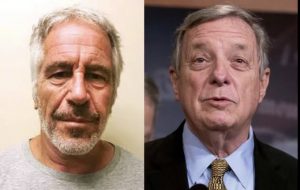Thousands of Belarusians took to the streets of Minsk for a new protest against strongman Alexander Lukashenko on Sunday, in defiance of threats by authorities to open fire after weeks of demonstrations.
The ex-Soviet nation has been gripped by historic protests after Lukashenko claimed victory in August 9 elections over Svetlana Tikhanovskaya, a popular opposition candidate.
Also Read: Belarus opposition leader takes risky diplomatic path
In a message ahead of Sunday’s protest, Tikhanovskaya urged Belarusians to press ahead with their demands “peacefully but persistently”.
“We will stop only when every political prisoner walks free, when members of law enforcement begin to defend the people, and rule of law and honest elections return to Belarus,” she said.
Tikhanovskaya, who was granted shelter in EU member Lithuania after the vote, has called on Lukashenko to quit power before October 25, warning he would otherwise face a crippling general strike.
Earlier this week police claimed that protests were becoming more radicalised and warned that law enforcement would use lethal force “if necessary”.
Belarusian authorities deployed military trucks on Sunday and phone networks were heavily disrupted.
Also Read: Emmanuel Macron to meet Belarus opposition leader on Tuesday
Local operator MTS Belarus said it had been ordered to limit access to “ensure national security”.
Rights group Viasna said police had begun detaining demonstrators in Minsk and elsewhere.
In a break from previous protests when demonstrators gathered in the city centre, protesters on Sunday marched along Partisan Prospect, the main transport artery in southeast Minsk and home to a number of factories.
The Nexta Live channel on social-media platform Telegram, which has coordinated protesters, urged Belarusians to express solidarity with workers during the protest, dubbed the “March of Partisans”.
“We, descendants of glorious warriors and partisans, are worthy of our forefathers who already defeated fascism once,” the channel said in a message to its more than two million subscribers.
During World War II, Nazi-occupied Belarus had Europe’s largest partisan movement.
The protest movement has kept up a series of large-scale demonstrations for the past two months, with 100,000 people or more taking to the streets every Sunday.
Also Read: Nobel Prize winner Svetlana Alexievich leaves Belarus for treatment in Germany
Tikhanovskaya, who maintains she won the August polls, says Lukashenko must also release political prisoners and halt “state terror” unleashed against peaceful protesters.
Several people have died and thousands have been arrested in a post-election crackdown, with harrowing accounts emerging of abuse in jails. Many said they had been tortured, beaten and humiliated in detention.
Police have acknowledged using water cannon and stun grenades against demonstrators but the use of live ammunition would mark a major escalation in the months-long standoff.
On Friday, a senior interior ministry official, Nikolai Karpenkov, said firearms would be used “in a humane manner” and selectively against protesters who put up resistance.
Ahead of Sunday’s march Ivan Tertel, head of the KGB security service, said provocations were being prepared to “destabilise the situation in our country”.
He did not say who was behind the alleged plot but said the organisers and their “foreign-based supervisors” planned to criticise law enforcement for tackling the provocations.
Alexei Antonov, a regular at opposition rallies, said ahead of the march that his friends and acquaintances supported Tikhanovskaya’s call for a general strike.
“They are discussing it, and many are ready to join,” Antonov told AFP.
Lukashenko, who has been in power for 26 years, has refused to step down and has secured backing from Russian counterpart Vladimir Putin.
The European Union has refused to recognise the results of the disputed vote. Last week EU foreign ministers agreed to impose sanctions on Lukashenko as the bloc seeks to step up pressure over the crackdown on protesters.






